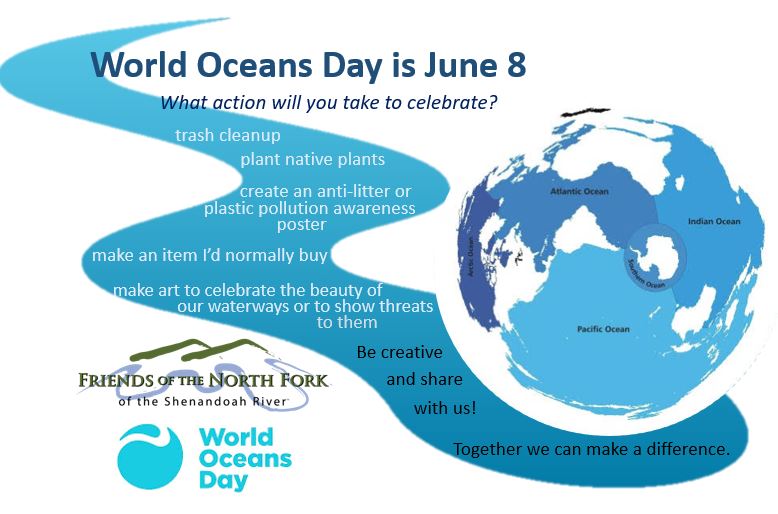
In the week leading up to World Oceans Day on June 8th, Friends is challenging our community to learn and participate in activities about the waterways in our backyard and how they connect with our oceans.
For more information on global celebrations and activities, check out the UN World Oceans Day Portal and WorldOceansDay.org.
We encourage you to participate in activities throughout the week to learn about our waterways and how they connect with our oceans. Then complete an activity that supports our oceans. Share your actions to inspire others and be entered into a drawing for a $50 gift certificate (click here for contest rules).
Pick your Issue, Plan your Action
There are many ways that our every day actions impact the health of our watershed and oceans, both positive and negatively. Click on some of the topics below for links on educational materials and ideas for actions you can take.
Everything Runs Downstream– World Oceans Day is a time to recognize that the actions we take have cumulative effects as our river converges with larger tributaries, to the Chesapeake Bay and into our oceans. Learn about how we are all connected through our waterways and how this awareness can lead to positive change with far-reaching impacts.
Plastic Pollution – As mismanaged plastic waste finds its way into our waterways, it accumulates in the ocean forming large garbage patches. As they break down into microplastics (less than 5mm in diameter) they are often ingested by marine life, having detrimental effects on the organism, and in turn, on the ocean’s entire ecosystem. Learn about how this happens and ways you can make a difference
Fertilizers, Algae Blooms, and Fish Kills – When rain washes over fertilized soils and into streams and rivers, it often brings excessive levels of nutrients into the water. These nutrients feed algal blooms. When severe, algae use up nearly all of the oxygen in the water, causing fish kills in rivers, estuaries and oceans. Learn about this process, called eutrophication, and what you can do to help.
Stormwater Runoff and Sediment – When rain falls, it is either absorbed in the soil, or runs-off and into our sewers and streams. Water flowing over impervious surfaces carries many harmful pollutants into our streams and rivers. Some stormwater pollutants include nutrients from lawn fertilizers, petroleum by-products from vehicles, and bacteria from human and animal waste. Stormwater runoff also erodes exposed soils, carrying sediment into streams and rivers. Too much sediment harms fish and reduces habitat space for some aquatic animals, and can kill submerged aquatic vegetation. These plants provide crucial habitat for aquatic organisms, produce oxygen, and trap sediment.
Share Your Efforts
Let the actions you take for World Oceans Day be an inspiration for others by sharing them with us to friends@fnfsr.org or with #NorthForkWorldOceansDayChallenge. Your submissions can be in the form of photos, narratives, poems, drawings, artwork or video/sound files– get creative! Anything your creativity provides. They can be activities you do for this day or related to ongoing projects you are proud of. Those who submit will be entered into the North Fork World Oceans Day Challenge drawing (click here for contest rules).
